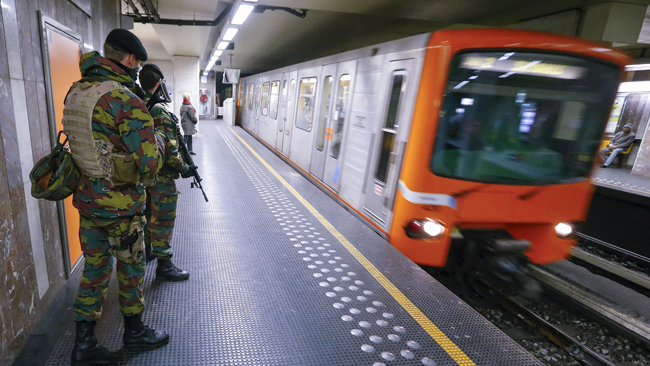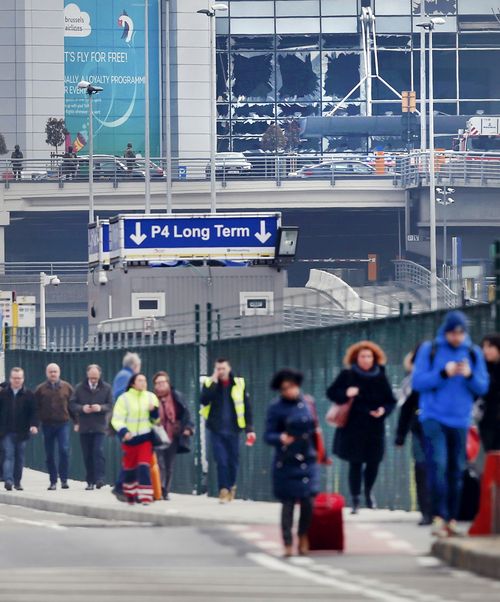“Attack against democratic Europe”
Brussels target of several terror attacks
On March 22, two hard explosions shake Zaventem Airport, killing at least 13 and injuring dozens of passengers. Belgian federal prosecutor Eric van der Sypt confirmed that a suicide bomber was involved. Eyewitnesses say they heard shots and people screaming in Arabic.
Later there were more explosions, at the Maalbeek metro station and Schuman square, in the vicinity of the US embassy and the EU offices, increasing the death toll by at least 10, according to various sources.
In connection with the emergency the Belgian authorities raised terror attack alert to the highest, fourth level, locked down the airport and the metro, while the European Commission asked its staff to stay in their offices or at home. Belgium’s Prime Minister Charles Michel said that the government was assessing the threat and introducing additional security measures, including military reinforcement and border controls.
We would like to remind our readers that on March 18 the Belgian police detained one of the key suspects in Paris terror attacks of November 13, 2015, which took 130 lives. These bombings in the Belgian capital are associated with that event. Belgian Interior Minister Jean Jambon said that the attacks were unavoidable and emphasized that they might be revenge for the arrest of Salah Abdelslam. Speaking on air of a Belgian radio station, he said: “We know that the elimination of one terrorist cell might trigger others into action.”
So far, not a single terrorist group has claimed the attacks, yet the IS supporters cheered the bombings in social networks, which gives the grounds to believe that it is the IS that stands behind this act of terror. However, experts suppose that the culprits will not assume responsibility until the operation is over.
Belgium’s neighbors take additional security measures following the bombings in Brussels. The Netherlands sent additional police units to the airports and borders. Security measures are toughened in New York, Gatwick Airport in London, Paris Charles de Gaulle Airport, and the airport of Frankfurt. All European institutions are transferred to the high alert level, and all the scheduled meetings are canceled. Because of the emergency in Brussels, British Prime Minister David Cameron called a COBRA security meeting. France’s President Francois Hollande held an emergency meeting at the Elysee Palace. Another 1,600 police agents will be involved in patrolling French airports, railroad stations, and borders, said French Interior Minister Bernard Cazeneuve after the meeting.

REUTERS photo
European and world leaders immediately reacted to the terror attacks against the very heart of Europe. Cameron tweeted: “I am shocked and concerned by the events in Brussels. We will do everything we can do to help.” According to The Economist’s editor Anne Applebaum, “Brussels must inspire Europeans and Americans to reinforce ties and institutions. Isolationism makes each of us weaker.” Swedish Prime Minister Stefan Lofven emphasized that the blasts in Brussels were an attack against democratic Europe. “We will never accept terror attacks in our open societies,” said the Swedish leader. The head of the Danish government Lars Lokke Rasmussen named the bombings “a despicable attack”: “My thoughts go out to the victims and their families. We are one with Belgium.” Ukraine’s Petro Poroshenko also expressed condolences to the victim’s families. He tweeted that he is shocked at the deadly terror attacks in the heart of Europe. “We must stop terrorism together,” stressed the Ukrainian president.
“TERROR ATTACKS IN BELGIUM MIGHT PROVIDE PUTIN WITH A PRETEXT TO REVIVE THE IDEA OF A NEW ANTI-TERROR FRONT WITH THE WEST”
Lilia SHEVTSOVA, senior research fellow, Brookings Institution:
“Terror attacks in Belgium might provide Putin with a pretext to revive the idea of a new anti-terror front with the West, as well as a larger idea of a new rearrangement of the world, where Russia might execute its ‘partnership’ with the Western civilization.
“Probably, during Kerry’s conversation with Lavrov (and also with Putin) not only the results of Russia’s new tactic game in Syria will be discussed, but also the deadlock in the implementation of Minsk accords, as well as two ideas, constantly promoted by the Russian leader: a united anti-terror front and negotiations on the new rearrangement of the world.
“Unfortunately, the West does not have an adequate response to the Brussels attack, which can be seen from ‘The Obama Doctrine,’ recently published by The Atlantic. Many are shocked and disappointed that America has chosen the so-called retrenchment principle as its doctrine: withdrawal in an own shell. When this happens, the West is unable to give a collective response. In principle, Europe can provide a collective reaction to new challenges, but only in the framework of NATO. Yet it can hardly happen with a paralyzed US, impending presidential election, time pressure, and a historic pause. The only hope is that the European and Western law-enforcement authorities have at least a minimum program of restraint and prevention, with which it could react to the spread of the terrorist threat in Europe. Given Putin’s intrusion in the Sunni and Shia conflict in the Middle East, we in Moscow are concerned about another issue: the outcome of international terrorism for Russia (which, under different circumstances, could spare it).”
Newspaper output №:
№19, (2016)Section
Topic of the Day





